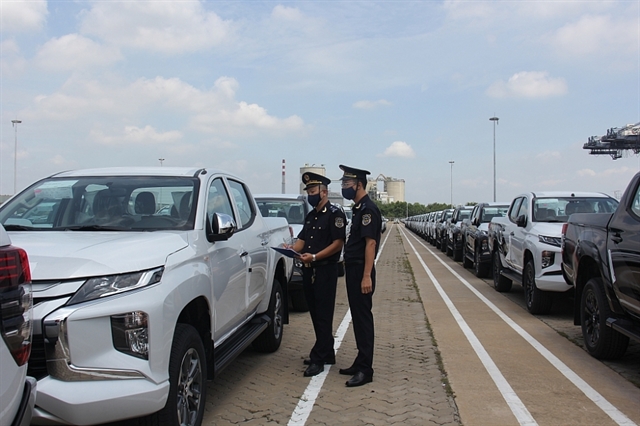 Economy
Economy

 |
| Customs officials check imported cars at Hiệp Phước Port in HCM City. Last year, Việt Nam imported 173,467 units valued at US$3.84 billion, surpassing the previous record of about 160,000 units in 2021. — Photo courtersy of haiquanonline.com.vn |
HÀ NỘI — Việt Nam posted an all-time high import of automobiles with 173,467 units valued at US$3.84 billion last year, surpassing the previous record of about 160,000 units in 2021, reported the General Department of Vietnam Customs.
The figures represented an increase of 8.5 per cent in volume and 5.1 per cent in value year-on-year.
In December alone, a total of 21,896 units worth $431.55 million were imported, marking the second biggest import in the year, behind November with roughly 23,000 units.
Indonesia and Thailand were the biggest auto exporters of Việt Nam. Indonesia surpassed Thailand to become the biggest seller in terms of volume but Thailand still ranked first in value.
Specifically, Việt Nam bought 72,671 units from Indonesia with a total value of over $1.05 billion. Meanwhile, auto imports from Thailand hit 72,032 units worth $1.43 billion.
The third biggest seller was China with 17,340 units valued at $714.5 million.
With a combined 162,043 units, the above three markets accounted for 93.4 per cent of the country’s total auto imports. The figure was also higher than the total auto imports recorded in 2021.
Imported cars still enjoy zero tax
The Prime Minister has signed and issued Decree No.126/2022/NĐ-CP stipulating Việt Nam’s special preferential import tariff to implement the ASEAN Trade in Goods Agreement (ATIGA) for the 2022-27 period. Accordingly, Việt Nam will continue to exempt import tax on CBU cars from ASEAN countries until the end of 2027.
Article 4 of Decree 126 and the attached appendix stipulate the conditions for applying special preferential import tax rates under ATIGA. Cars must fully meet some conditions.
Imports from countries that must be ATIGA members, including Brunei, Cambodia, Indonesia, Laos, Myanmar, Malaysia, the Philippines, Singapore and Thailand.
Cars must meet regulations on origin of goods (including regulations on direct shipping) and have a Certificate of Origin (C/O) Form D or a certificate of origin in accordance with the provisions of ATIGA and current regulations of law.
Therefore, vehicles from ASEAN, mainly Thailand and Indonesia, will continue to have a competitive advantage over locally assembled cars.
Previously, according to ATIGA, from January 1, 2018, CBU cars imported within ASEAN were exempt from import tax provided that the products have a localisation rate of over 40 per cent.
In the 2018-22 period, the implementation of ATIGA paved the way for many types of cars from ASEAN, mainly from Thailand and Indonesia, to enter Việt Nam, accounting for about 70-80 per cent of total imported cars and 30-35 per cent of total automobile sales each year. — VNS




